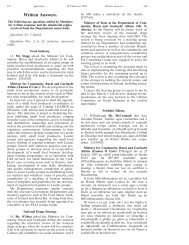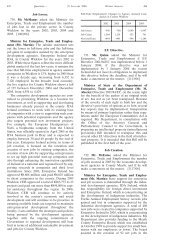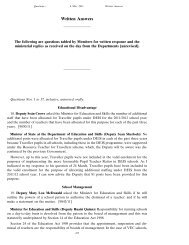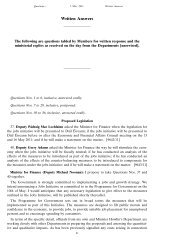Written Answers. - Parliamentary Debates - Houses of the Oireachtas
Written Answers. - Parliamentary Debates - Houses of the Oireachtas
Written Answers. - Parliamentary Debates - Houses of the Oireachtas
Create successful ePaper yourself
Turn your PDF publications into a flip-book with our unique Google optimized e-Paper software.
Questions— 14 February 2012. <strong>Written</strong> <strong>Answers</strong><br />
Tax Yield<br />
180. Deputy Ciarán Lynch asked <strong>the</strong> Minister for Finance <strong>the</strong> value <strong>of</strong> legitimate green diesel<br />
fuel transactions recorded for <strong>the</strong> years 2010 and 2011; <strong>the</strong> current monitoring system for <strong>the</strong><br />
sale <strong>of</strong> green fuel; if <strong>the</strong>re is any record or database <strong>of</strong> purchasers <strong>of</strong> green diesel and quantities<br />
purchased per transaction; if he will provide an estimate <strong>of</strong> <strong>the</strong> loss in quantity and cost in<br />
revenue due to fuel laundering for <strong>the</strong> years 2010 and 2011; and if he will make a statement<br />
on <strong>the</strong> matter. [8401/12]<br />
Minister for Finance (Deputy Michael Noonan): I am informed by <strong>the</strong> Revenue Commissioners<br />
that <strong>the</strong> quantities <strong>of</strong> marked diesel for which mineral oil tax was paid in 2010 and 2011<br />
were 1.226 billion litres and 1.155 billion litres respectively, and <strong>the</strong> net mineral oil tax receipts<br />
for those years in respect <strong>of</strong> that fuel were €51.04 million and €50.49 million. Premises or places<br />
from which marked diesel is sold or delivered, o<strong>the</strong>r than tax warehouses or certain small-scale<br />
operations, are required to be approved by <strong>the</strong> Revenue Commissioners in accordance with<br />
<strong>the</strong> Mineral Oil Tax Regulations 2001 (S.I. No. 442 <strong>of</strong> 2001). Those Regulations also require<br />
<strong>the</strong> keeping <strong>of</strong> specified records <strong>of</strong> stocks, sales and movements <strong>of</strong> fuels by mineral oil traders.<br />
The Finance Bill 2012 proposes to enhance <strong>the</strong> supervision and control <strong>of</strong> <strong>the</strong> mineral oils<br />
supply chain by requiring that, in future, any person dealing in marked mineral oils will have<br />
to be licensed by <strong>the</strong> Revenue Commissioners to do so. It is envisaged that this important<br />
change will be complemented by amendments to <strong>the</strong> Mineral Oil Tax Regulations that will lay<br />
down new requirements for <strong>the</strong> recording and reporting <strong>of</strong> transactions by mineral oil traders.<br />
The Deputy will appreciate that it is not possible to estimate accurately <strong>the</strong> loss to <strong>the</strong><br />
national Exchequer from particular activities in <strong>the</strong> shadow economy such as fuel laundering.<br />
It is clear, however, that illegal activity in <strong>the</strong> fuel market is significant, and that it poses a<br />
threat to <strong>the</strong> tax yield and to legitimate business. Combating it will, <strong>the</strong>refore, continue to be<br />
a priority for <strong>the</strong> Revenue Commissioners, and <strong>the</strong> legislative action that is being taken will<br />
provide additional support for <strong>the</strong>m in this important work.<br />
Tax Code<br />
181. Deputy Seán Kyne asked <strong>the</strong> Minister for Finance in view <strong>of</strong> <strong>the</strong> financial difficulties<br />
arising from <strong>the</strong> extraordinary economic and financial situation being experienced by persons<br />
who purchased a second residential property as a means <strong>of</strong> securing funds for retirement and<br />
so forth, if he will consider increasing <strong>the</strong> amount claimable <strong>of</strong> mortgage interest against tax<br />
from 75% to 100%, particularly as <strong>the</strong> cost <strong>of</strong> running a non-residential property is a legitimate<br />
business expense. [8411/12]<br />
Minister for Finance (Deputy Michael Noonan): As <strong>the</strong> Deputy notes an individual who<br />
rents out <strong>the</strong>ir residential property may be allowed a deduction (subject to certain conditions)<br />
in computing <strong>the</strong> taxable rents from that letting <strong>of</strong> 75% <strong>of</strong> <strong>the</strong> interest accruing on money<br />
borrowed to purchase, improve or repair that property. The level at which interest repayments<br />
could be claimed against tax for residential rental properties was reduced from 100% to 75%<br />
in April 2009 as part <strong>of</strong> an urgent revenue-raising package aimed at stabilising <strong>the</strong> public<br />
finances. The restriction, which applies to interest accruing on or after 7 April 2009, significantly<br />
reduced <strong>the</strong> cost <strong>of</strong> this relief to <strong>the</strong> Exchequer.<br />
I am informed by <strong>the</strong> Revenue Commissioners that <strong>the</strong> amount <strong>of</strong> tax foregone in 2009 (<strong>the</strong><br />
most recent year available) by allowing a deduction for interest on borrowings to be <strong>of</strong>fset<br />
against all rental income assessable under Case V, Schedule D for both residential and commercial<br />
property was estimated at €745 million. Increasing <strong>the</strong> relief for residential properties to<br />
100% could result in an additional annual cost to <strong>the</strong> Exchequer <strong>of</strong> <strong>the</strong> order <strong>of</strong> €100 million.<br />
392











![[Deputy Michael Noonan.]](https://img.yumpu.com/30494839/1/190x245/deputy-michael-noonan.jpg?quality=85)




